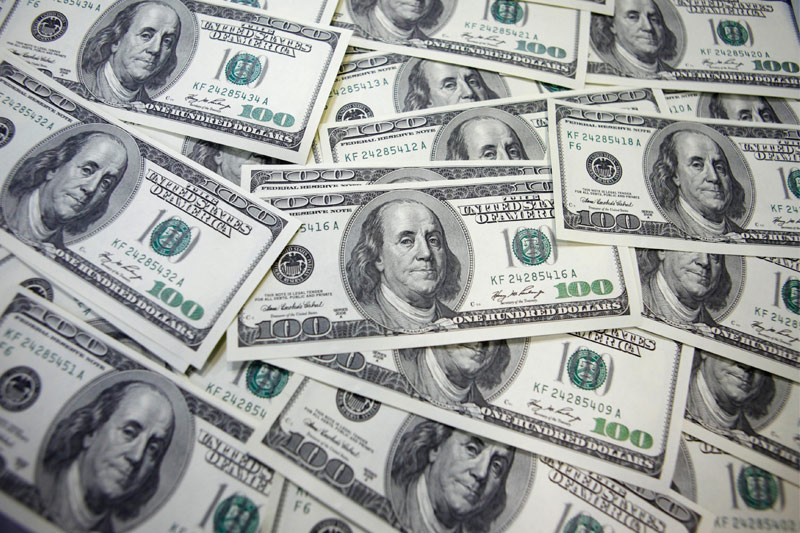Investing.com - The dollar rose against most major world currencies on Monday, regaining composure after dropping Friday on disappointing May jobs figures.
Talk that Germany remains opposed to participating in a single bond issue to prop up debt-ridden countries like Greece sent the euro falling and the dollar rising on a global safe-haven play.
In Asian trading on Monday, EUR/USD was trading down 0.37% at 1.2389.
On Friday, the U.S. Bureau of Labor Statistics reported that the economy added a net 69,000 net nonfarm payrolls in May, far below expectations for a gain of around 150,000.
The unemployment rate rose to 8.2% from 8.1%.
The jobs data sparked talk the Fed will consider stimulating the economy via monetary easing measures to ensure price stability and more optimal employment conditions at the expense of the dollar's strength.
Weak manufacturing data sent the greenback falling as well.
The Institute for Supply Management reported Friday that its national factory activity index dropped to 53.5 in May from 54.8 in April, just missing expectations for 53.9.
However, the dollar resumed its safe-haven status in Asian trading on Monday, on talk Germany remains opposed to taking part in issuing a Euro Bond, a single instrument financed and underwritten by all eurozone nations to assist more indebted countries like Greece.
Soft manufacturing and service-sector data out of China sent the dollar gaining as well.
The greenback was up against the pound, with GBP/USD down 0.08% and trading at 1.5351.
The U.S. currency was up against the yen, with USD/JPY trading up 0.18% at 78.16, and up against the Swiss franc, with USD/CHF trading up 0.34% at 0.9691.
The dollar was up against its cousins in Canada, Australia and New Zealand, with USD/CAD up 0.24% at 1.0436, AUD/USD down 0.59% at 0.9642 and NZD/USD down 0.44% at 0.7514.
The dollar index, which tracks the performance of the greenback versus a basket of six other major currencies, was up 0.25% at 83.11.
Later Monday, the U.S. will unveil official data on factory orders, a leading indicator of output.
Talk that Germany remains opposed to participating in a single bond issue to prop up debt-ridden countries like Greece sent the euro falling and the dollar rising on a global safe-haven play.
In Asian trading on Monday, EUR/USD was trading down 0.37% at 1.2389.
On Friday, the U.S. Bureau of Labor Statistics reported that the economy added a net 69,000 net nonfarm payrolls in May, far below expectations for a gain of around 150,000.
The unemployment rate rose to 8.2% from 8.1%.
The jobs data sparked talk the Fed will consider stimulating the economy via monetary easing measures to ensure price stability and more optimal employment conditions at the expense of the dollar's strength.
Weak manufacturing data sent the greenback falling as well.
The Institute for Supply Management reported Friday that its national factory activity index dropped to 53.5 in May from 54.8 in April, just missing expectations for 53.9.
However, the dollar resumed its safe-haven status in Asian trading on Monday, on talk Germany remains opposed to taking part in issuing a Euro Bond, a single instrument financed and underwritten by all eurozone nations to assist more indebted countries like Greece.
Soft manufacturing and service-sector data out of China sent the dollar gaining as well.
The greenback was up against the pound, with GBP/USD down 0.08% and trading at 1.5351.
The U.S. currency was up against the yen, with USD/JPY trading up 0.18% at 78.16, and up against the Swiss franc, with USD/CHF trading up 0.34% at 0.9691.
The dollar was up against its cousins in Canada, Australia and New Zealand, with USD/CAD up 0.24% at 1.0436, AUD/USD down 0.59% at 0.9642 and NZD/USD down 0.44% at 0.7514.
The dollar index, which tracks the performance of the greenback versus a basket of six other major currencies, was up 0.25% at 83.11.
Later Monday, the U.S. will unveil official data on factory orders, a leading indicator of output.
